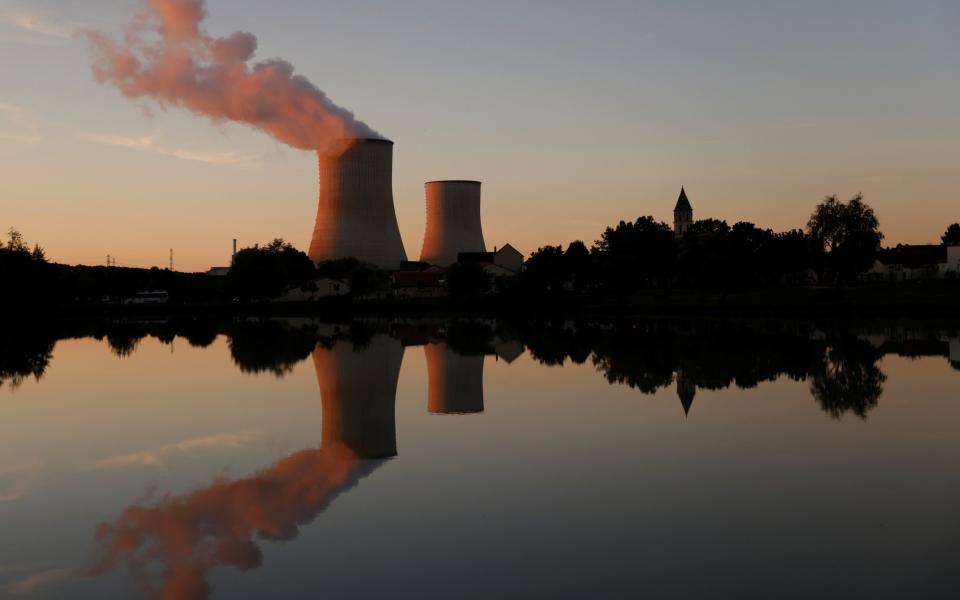Why France is worsening Europe’s energy crisis

Rising 180m high, the cooling towers of the Civaux nuclear power plant have graced the skyline near France’s Vienne River for more than two decades.
The plant had been a workhorse in EDF’s vast fleet of reactors, generating electricity for millions in the nearby university city of Poitiers and beyond.
That is until August 2021 when inspectors found a serious problem: tiny cracks, detectable by ultrasonic sensors, had opened up around the joints of some of the pipes in its emergency cooling system.
On November 20, EDF decided to close it down for further checks, with corrosion suspected.
Little did they know their problems were only just beginning.
By December, EDF, 84pc-owned by the French state, announced the closure of two further reactors at the Chooz B nuclear plant in the north-east, which used similar equipment.
Further checks revealed the issue was widespread. By April 2022, 28 of EDF’s 56 reactors were offline due to maintenance or corrosion.
That figure is only slightly improved today, with 25 reactors currently offline, 16 of which are considered “sensitive or highly sensitive” to the corrosion problems.
It could not come at a worse time. The crumbling state of France’s nuclear fleet has coincided with major gas shortages in Europe as Russia strangles supplies following its invasion of Ukraine.
In normal years, France is a major exporter of electricity, sending 5-10pc of its vast output to its neighbours, including across the Channel to the UK.
Yet at a time of huge need, it has had to import power instead, pushing up power prices in and outside France and raising concerns over security of supply during winter.
Problems in France come as Norway’s hydropower output has also suffered this summer from low rainfall.
EDF is now racing to bring reactors back online this winter amid corporate turmoil and a weakened balance sheet.

Emmanuel Macron, France’s president, has set in motion the process to fully nationalise the company, which expects to take a €29bn (£25.2bn) hit to its profits this year due to the lower output.
EDF, meanwhile, is suing the French government after Macron forced it to sell energy at a loss in January in an attempt to support households and businesses as costs soared.
A recent bout of strikes has added to the disruption. Strikes over wages by the FNME-CGT union in October delayed maintenance plans on 17 reactors, according to Reuters, with schedules set back by up to three weeks in some cases.
It prompted a warning from RTE, France’s grid operator, of “heavy consequences” for power supplies over winter.
In November, EDF cut its nuclear output expectations for the year for the fourth time, to 275-285 terawatt-hours compared to 280-300 terawatt-hours previously. That compares to nuclear production of 360 terawatt-hours in 2021.
Regis Clement, EDF’s deputy director of nuclear production, claims the company has found a way to standardise repairs to get as many reactors back into action as soon as possible.
As things stand, of the 16 reactors offline with potential corrosion problems, six have had their repairs finished, four are being treated and will be repaired by early 2023, while the other six will be checked in 2023.
EDF says it is “doing its utmost to optimise the availability of its nuclear fleet in complete safety for the winter season".
But the outlook looks bleak. The company was dealt a blow in early November when a radioactive leak was found in the cooling circuit of its Civaux plant, potentially delaying its restart.
With low winter output, France’s grid operator is publishing daily power supply forecasts, with a “red alert” meaning consumers should cut power use to avert potential blackouts.
The problems have serious implications for Britain, which typically needs to import power during peak times in the winter. National Grid has warned of blackouts if it cannot get power from the continent if gas supplies fall short.
“The issue is that the market assumes that we can import power from France when in difficulty,” says Phil Hewitt, director at market specialist EnAppSys. “The French market may not be able to provide it.”
Power prices for January in France are far higher than their neighbours, in a sign the market is expecting tight supplies.
John Pettigrew, the chief executive of National Grid, last week struck a more optimistic note, in a sign of hopes across the continent that mutual support will prevail.
“The great thing about interconnectors [power cables connecting the UK to Europe] is they flow both ways, and therefore they support both mainland Europe and the UK,” he said.
“The peaks are often at different times. It’s one of the beauties of the interconnectors. And the system operators in the UK and in Europe recognise that and work to coordinate and cooperate together.”
Fabian Rønningen, power market analyst at Rystad Energy, warns of the ongoing risk, however.
"There has been quite a lot of good news recently, with quite a lot of units due to come online in November. If November goes as planned, I think that will provide a lot of relief to the market.
"But French power is still trading at a premium to Germany power, so traders still think it's going to be a very tight winter."
“In the one year where everything else is going wrong, we also have the problems with nuclear. [...] Much of the pain that we have had in 2022 could have been removed if it had been a normal year for nuclear power and hydropower,” he adds.
“It’s the worst timing ever.”

 Yahoo Finance
Yahoo Finance 